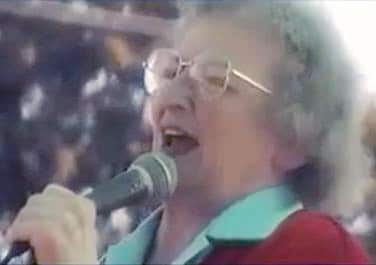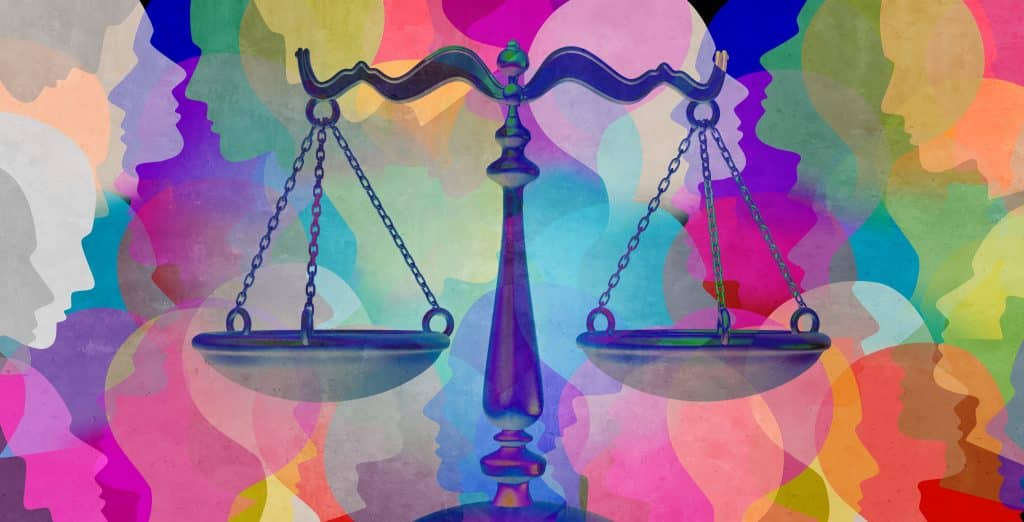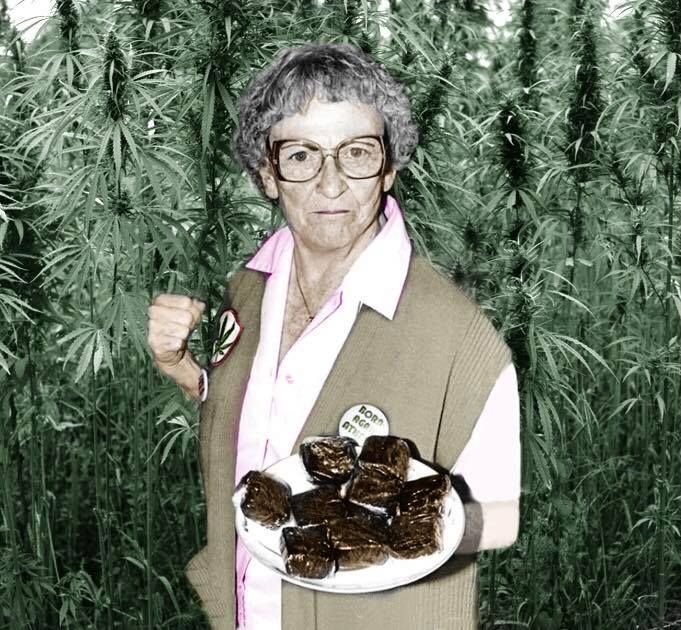If you’ve ever had a pot brownie, then you have Brownie Mary to thank for that. An elderly woman known for her exceptional baking skills, is not uncommon for many grandmas. Except Mary wasn’t baking treats for her grandkids, she was crafting cannabis edibles for a community of disenfranchised people that she cared for as if they were her own children.
Often referred to as the Florence Nightingale of HIV/AIDS, and the creator of the weed brownie, Mary was famous for baking delicious, cannabis-infused treats for gay men and other people who were suffering from wasting syndrome, a condition categorized by diminished appetite and significant weight loss. It’s common in people with HIV/AIDS, cancer, and other illnesses.
In addition to her humanitarian work, for which she was arrested 3 times, Brownie Mary was also the reason California became the first state to legalize medical cannabis, as she had a big part in the passage of Proposition 215 back in 1996.
Bottom line, Mary was an amazing, powerhouse of woman. She played such a huge role in the cannabis industry as we know it today, that everyone who smokes weed should know her name and story. Let’s take a closer look at the incredible life of Brownie Mary.
Who is Brownie Mary?

Mary Jane Rathbun (yes, Mary Jane is her birth name given to her by her conservative Irish Catholic mother) was born on December 22, 1922, in Chicago, Illinois. Soon after, her family moved to Minneapolis, Minnesota, where Mary attended a strict catholic school. One of her first acts of rebellion was at 13, when she hit a nun who tried to cane her.
She moved out on her own when she was a teenager and took to waitressing to support herself (keep in mind, this was during a time when it was especially hard for a young, unmarried woman to do such a thing). She continued working as a waitress for most of her adult life. From a young age, she was drawn to activism and got involved in many important causes, from campaigning for miners’ rights to form unions in Wisconsin, to promoting women’s healthcare and abortion rights in Minneapolis.
She moved to San Francisco, California, during World War II. Shortly after getting there, she married a man she met at a USO dance and had a daughter named Peggy, who was born in 1955. They divorced shortly after and Mary moved with her daughter to Reno, Nevada. In the early 1970s, Peggy was killed by a drunk driver, and Mary moved back to San Francisco.
Cannabis activism
Shortly after moving back to San Francisco, Mary met Dennis Peron at Café Flore in the Castro district, in a chance encounter that would change the trajectory of her activism work forever. Peron was a well-known cannabis and LGBTQ activist. He was a prominent figure in California politics and was an adamant supporter of medical cannabis use. He watched how it provided relief to his partner, who eventually died from AIDS in 1990. He wanted other people to be able to benefit from weed as well.
Mary started baking her brownies, and Peron was selling them at his Big Top pot supermarket on Castro Street – and thus Brownie Mary was born. The majority of Mary’s customers were gay men, especially after HIV/AIDS began to spread more rampantly in the 1980s. Noticing this, Mary started providing her brownies to sick people, whom she referred to as her “kids”, totally free of charge. Her $650 monthly social security check, along with donations from the community, helped her purchase baking supplies.
“I know from smoking pot for over 30 years that this is a medicine that works,” Brownie Mary stated. “It works for the wasting syndrome; these kids have no appetite; but when they eat a brownie, they get out of bed and make themselves some food. And for chemotherapy, they eat half a brownie before a session, and when they get out, they eat the other half. It eases the pain. That’s what I’m here to do.”
Around 1984, Brownie Mary started volunteering every week in the AIDS ward (Ward 86) at San Francisco General Hospital. She often helped by wheeling patients to and from the radiology department and taking their specimens to the lab. In 1986, she was named “Volunteer of the Year” by the hospital ward. TV reporter and author, Carol Pogash, also profiled Mary in her 1992 book titled: As Real as it Gets: The Life of a Hospital at the Center of the AIDS Epidemic.
Multiple arrests
By the early 1980s, Mary was baking about 600 brownies per day. She advertised them on local bulletin boards around San Francisco, calling them her “original recipe brownies” that were “magically delicious”. Eventually, an undercover officer caught on to what she was doing and a raid was conducted on her home on January 14, 1981.
Thank you for stopping in. Head over to the Cannadelics Weekly Newsletter for direct updates; and get access to awesome deals on cannabis buds, vapes, edibles, smoking devices and equipment, cannabinoid compounds, and some psychedelic products! Go get high responsibly!
Police found over 18 pounds of cannabis flower, 600+ brownies, and some other drugs and paraphernalia. She was 57-years-old at the time of this arrest, and this is the time that the media started referring to her openly as Brownie Mary. In this case, she ended up pleading guilty to nine counts of possession and served three years’ probation as well as 500 hours of community service.
A little over a year later, on December 7, 1982, Mary was walking down Market Street to deliver a batch of brownies to a friend who had cancer, when she happened to run into one of the officers involved in her arrest. He searched her bag and found about four dozen brownies. She was arrested and charged with probation violation and multiple counts of possession, but the district attorney dropped the charges against her.
Fast forward a decade to July 19, 1992, and that’s when Brownie Mary was arrested for her third time. She was held up during the middle of the baking process, while pouring cannabis into brownie batter at the home of a local grower. She was charged with felony possession again, 2.5 pounds this time, and released on bail. The district attorney tried to prosecute her, but she plead not guilty and was eventually acquitted of these charges too.
Her legal team argued the defense of “medical necessity”, claiming that Mary was “able to testify that her deliveries were made to assist others in need, not to advance individual greed, that the nobility of her actions outweighed the reprehensibility of her offense according to the law.”

In one of her most famous moments at a San Francisco rally in 1992, Rathbun reportedly cried out: “If the narcs think I’m gonna stop baking brownies for my kids with AIDS, they can go f*** themselves in Macy’s window”. This about a month after her third arrest, and she continued to bake about 600 brownies every day throughout the height of the HIV/AIDS crisis.
Prop 215
In the early 90s, Mary helped her friend Dennis Peron open the first medical cannabis dispensary in the United States, known as the San Francisco Cannabis Buyers Club. The Buyers Club operated from 1992 to 1998 and had over 8,000 members at one point. During that time, Peron and a group of cannabis activists drafted Proposition 215, also known as the Compassionate Use Act.
Prop 215 passed in 1996 with more than 55 percent of the vote, making California the first state to permit the medicinal use of cannabis. Less than two years later, Washington, Oregon, Alaska, and Nevada passed their own medical cannabis initiatives. Today, 37 states have medical cannabis, and 21 of those have passed recreational use laws as well.
“It wasn’t the hippies per se, it wasn’t the standard establishment marijuana movement players, but it was the gay people who legalized pot in California because of the AIDS epidemic,” says John Entwistle, Peron’s husband and co-author of Proposition 215. “That’s been forgotten to some extent.” And Brownie Mary was right there at the heart of it all, lovingly helping people in her community while at the same time, bringing media attention to the cause.
Brownie Mary’s legacy
The work Mary Jane Rathbun did for AIDS patients is definitely under looked and under appreciated these days. During a time when there was no relief from the symptoms they experienced…she was their guardian angel.
After the passage of Prop 215, Mary’s health began to decline, and she suffered from a few different medical conditions including osteoarthritis, COPD, and colon cancer. As expected, she self-medicated with cannabis to ease her pain. In 1999, at the age of 76, Mary passed away from a heart attack (December 22, 1922 – April 10, 1999). The following week, 300 people gathered in a candlelight vigil in her name at Castros on Market Street.
“We loved to ask her, ‘What’s the recipe?’ and she always made Betty Crocker jokes,” Entwistle remembered. “She once explained it to me: When you’re buying boxes of brownies, look at how much oil the recipe calls for, and go for the one that uses the most oil. But the mystery—the recipe for her brownies—goes to her grave.”
Thanks for making your way over! We appreciate you stopping in at Cannadelics.com; where we work to bring you the best in independent news coverage for the cannabis and psychedelics spaces. Visit us regularly for daily news, and sign up to the Cannadelics Weekly Newsletter, so you’re always on top of what’s going on.









